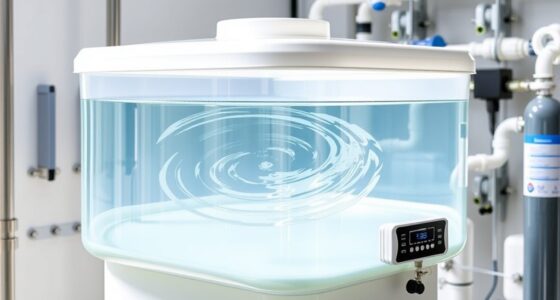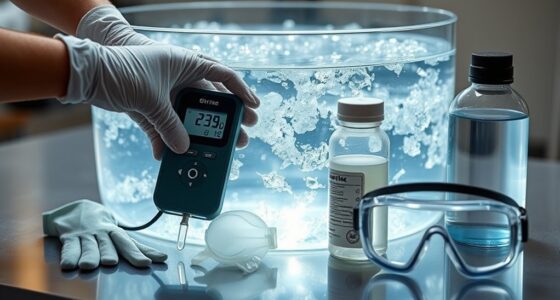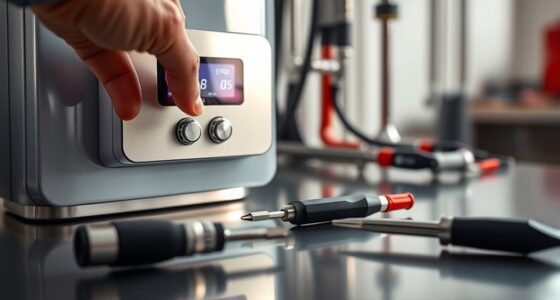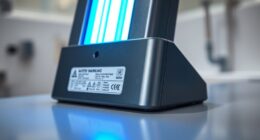To master scale control for your tankless heater in a weekend, start by understanding how hard water causes mineral buildup, then gather key data like mineral levels, water temperature, and flow rate. Input this info carefully into a scale control calculator, ensuring accuracy. Use the results to assess risk and plan maintenance, choosing suitable prevention methods. Keep testing and adjusting your approach; more tips await if you keep exploring.
Key Takeaways
- Gather accurate mineral analysis data (calcium, magnesium, hardness) and input it correctly into the calculator.
- Understand water chemistry factors like pH and TDS to interpret scale risk levels effectively.
- Use calculator results to identify high-risk conditions and plan appropriate scale control methods.
- Implement preventive measures such as water softening, chemical treatments, and regular system inspections.
- Continuously monitor water quality and system performance to maintain efficiency and extend heater lifespan.
Understanding the Impact of Hard Water on Your Tankless Heater
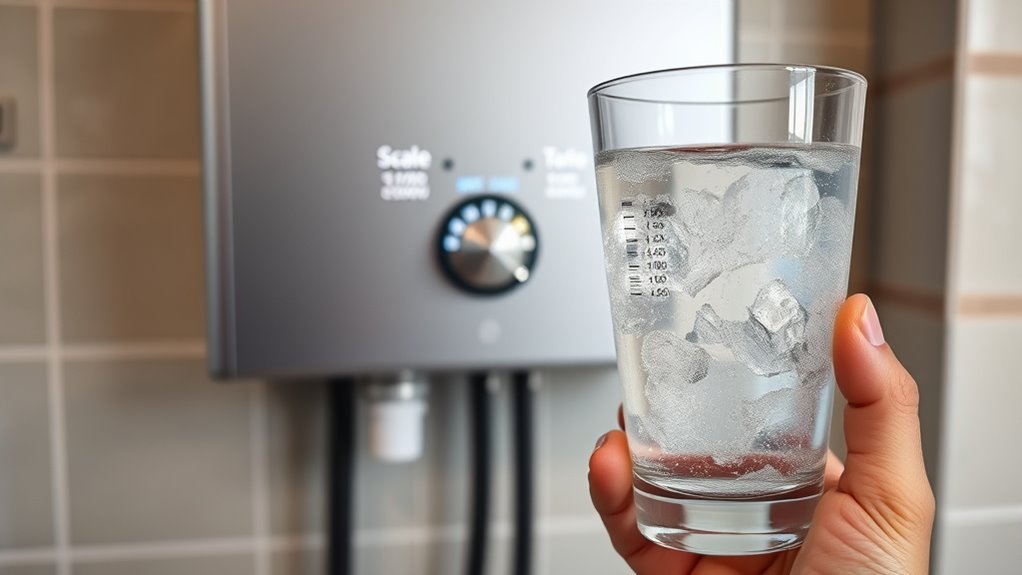
Hard water contains high levels of minerals like calcium and magnesium, which can cause significant problems for your tankless heater. These minerals increase water mineralization, leading to scale buildup inside the unit. As minerals accumulate, they interfere with heat transfer, reducing efficiency and risking costly repairs. Additionally, mineral-rich water can disrupt the pH balance, causing corrosion or further mineral deposits. Properly understanding how mineralization affects your water’s chemistry helps you anticipate potential issues. When water has a high mineral content, it’s more likely to form limescale, which hardens over time and hampers your heater’s performance. Monitoring water quality and pH balance is vital to prevent mineral buildup and keep your tankless heater running smoothly. Furthermore, color accuracy in water chemistry can influence how minerals precipitate and adhere to surfaces inside the heater.
Gathering the Necessary Information for the Scale Control Calculator
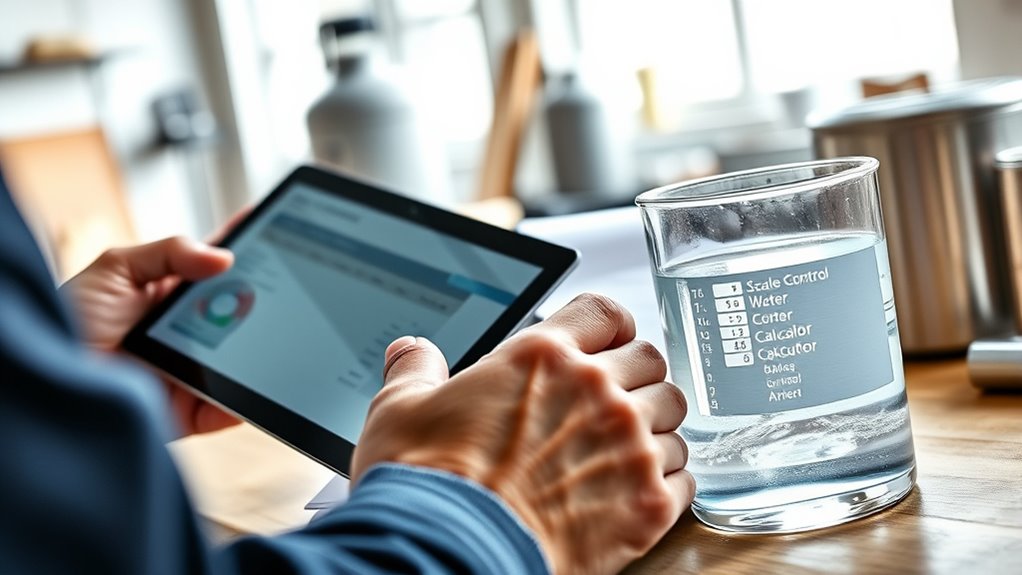
To accurately use the scale control calculator, you need to gather specific information about your water supply and heater. Start with mineral analysis, which reveals mineral content like calcium and magnesium levels that contribute to scaling. Also, consider your water filtration system, as it affects mineral levels and scale formation. Use the table below to organize your data:
| Data Needed | Description |
|---|---|
| Mineral analysis | Calcium, magnesium, total hardness |
| Water filtration | Type of filter and its effectiveness |
| Water temperature | Typical temperature of hot water |
| Flow rate | Gallons per minute (GPM) |
This information forms the foundation for effective scale management and helps you optimize your tankless heater’s performance. Properly managing mineral levels and maintaining the system can also reduce the formation of scale buildup, ensuring longer-lasting and more efficient operation.
Inputting Data Correctly: Step-by-Step Guidance

Accurate data entry is essential for effective scale control. You need to be careful to make certain to avoid common input mistakes that could skew results. Follow these step-by-step instructions to ensure your data is precise and reliable. Proper measurement techniques and understanding the specific parameters involved can greatly improve your calibration process.
Precise Data Entry
Ensuring precise data entry is vital for effective scale control in tankless heaters. Accurate input of water hardness levels helps the calculator predict potential scale formation more reliably. Start by double-checking your water hardness readings from a trusted source, such as a lab test or local water report. Enter these values carefully, avoiding typos or misreading figures. Be consistent with units—if your data is in grains per gallon, convert it appropriately if needed. Proper data entry guarantees the calculator’s recommendations are tailored to your specific water quality, reducing the risk of mineral build-up. Remember, even small errors can lead to inaccurate predictions, making precise data entry crucial for maintaining your heater’s efficiency and longevity. Understanding industry trends aids in interpreting water quality information accurately.
Common Input Mistakes
Many common input mistakes happen when entering data into the scale control calculator, and these errors can substantially impact its accuracy. One frequent mistake is neglecting to account for water softening treatments or misunderstanding mineral deposits‘ effects. If you underestimate mineral content, the calculator might suggest inadequate scale prevention measures. Be sure to input accurate hardness levels, as mineral deposits can quickly accumulate without proper water softening, leading to inaccurate scaling predictions. Double-check your data for consistency, especially when recording local water conditions. Avoid assuming uniform mineral content across your system; variations can skew results. Additionally, understanding water quality factors such as pH and total dissolved solids (TDS) can further improve the accuracy of your readings. Correct input ensures the calculator provides reliable guidance on preventing scale buildup, helping you better manage your tankless heater’s performance and lifespan.
Interpreting the Results to Assess Scale Buildup Risk

Interpreting the results of your scale control tests is crucial for accurately evaluating the risk of buildup in your tankless heater. When reviewing the data, focus on key indicators such as mineral concentration levels and temperature thresholds. Higher readings suggest a greater potential for scale buildup, signaling the need for proactive measures. Use these results to assess your risk level—low, moderate, or high—and determine if adjustments are necessary. Understanding these measurements helps prevent costly damage and guarantees ideal heater performance. Remember, consistent interpretation of your test outcomes strengthens your risk assessment process, enabling you to address scale issues early. Accurate interpretation is essential for maintaining efficient operation and extending the lifespan of your tankless heater. Additionally, automation in business can be leveraged to monitor and analyze these data points continuously, ensuring timely interventions.
Setting Up a Regular Maintenance Schedule Based on Calculator Insights

Once you’ve analyzed your scale control calculator insights, the next step is to establish a regular maintenance schedule that aligns with these findings. This guarantees your system stays efficient and prevents scale buildup. First, schedule periodic scale calibration checks to verify your system’s accuracy and adjust as needed. Second, incorporate routine water filtration inspections to reduce mineral content and delay scale formation. Third, set specific intervals—such as quarterly or semi-annual visits—to clean filters, flush the system, and reassess your scale control measures. Regularly reviewing pinball machine maintenance techniques can also provide useful insights into keeping your system in top shape. Consistent maintenance based on calculator insights keeps your tankless heater running smoothly and extends its lifespan. Staying proactive with these steps helps you avoid costly repairs and maximize performance.
Choosing the Right Scale Prevention Methods for Your System
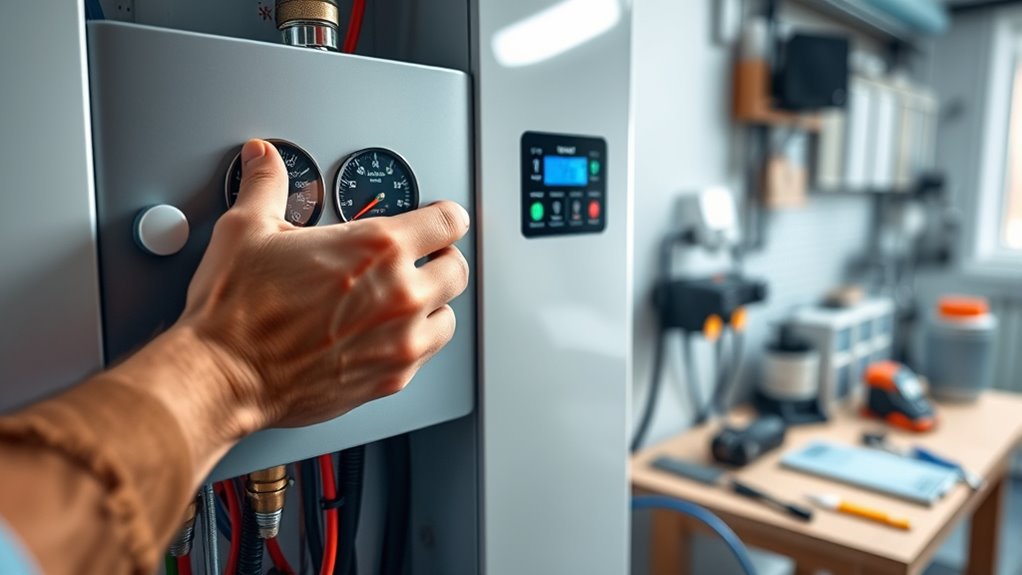
Choosing the right scale prevention methods starts with understanding your system’s specific water quality and usage patterns. If your water has high mineral content, water softening can effectively reduce hardness and prevent scale buildup. Installing a water softener removes calcium and magnesium ions, decreasing scale formation. Alternatively, scale inhibitors can be added directly to your system; these chemicals form a protective film on surfaces, preventing mineral deposits from adhering. Consider your water source and system flow rates when deciding. For instance, if you have hard water and high usage, combining water softening with scale inhibitors offers robust protection. Always choose methods compatible with your tankless heater’s specifications and consult manufacturer recommendations. Selecting the appropriate solution ensures efficient operation and prolongs your system’s lifespan. Understanding your water quality helps tailor the best scale control strategy for your needs.
Applying Preventive Measures and Testing Effectiveness

To keep your tankless heater running smoothly, you need to apply preventive measures and verify their effectiveness regularly. Conducting inspections, using chemical treatments, and monitoring performance help you catch early signs of scaling. These steps make certain your system stays efficient and prevents costly damage down the line. Regularly checking for filter maintenance ensures optimal purification and prevents inefficiencies caused by dirty filters.
Regular System Inspections
Regular system inspections are essential for maintaining the efficiency and longevity of your tankless heater. During inspections, check for signs of mineral deposits, especially in areas with hard water. Regularly assess your water softening system to guarantee it’s functioning properly, as untreated mineral buildup can reduce heater performance. Incorporate rustic decor elements into your maintenance routine to create a cozy, farmhouse-inspired approach to system care. Consider these key steps:
- Inspect heat exchangers for mineral deposits and clean as needed.
- Test water softening effectiveness to prevent scale buildup.
- Monitor for any leaks or corrosion that could worsen mineral accumulation.
Chemical Treatment Methods
Chemical treatment methods can markedly reduce mineral buildup in your tankless heater by applying preventive measures and regularly testing their effectiveness. Using corrosion inhibitors helps protect internal components from rust and corrosion, extending system life. pH adjustment ensures water remains within a safe range, minimizing scale formation. Regular testing verifies the effectiveness of your treatments, allowing timely adjustments. Implementing these strategies involves choosing appropriate chemicals, monitoring water quality, and maintaining proper dosage levels. Consistency is key to preventing scale buildup and corrosion. Below is a visual guide:
| Treatment Method | Purpose | Key Considerations |
|---|---|---|
| Corrosion Inhibitors | Prevent rust and metal deterioration | Regular dosing, compatibility with heater |
| pH Adjustment | Control water acidity/alkalinity | Testing pH levels frequently |
| Chemical Testing | Verify treatment effectiveness | Use testing kits or lab analysis |
| Preventive Maintenance | Reduce mineral buildup | Schedule routine chemical applications |
| Monitoring Results | Ensure ongoing protection | Record and adjust as needed |
Performance Monitoring Techniques
Ever wondered how you can guarantee your tankless heater stays protected from mineral buildup and corrosion? Performance monitoring techniques are key. First, install scale sensors to detect early signs of scale formation, allowing you to act promptly. Second, regularly test water hardness levels to identify when water softening is needed. Third, schedule routine inspections to verify the effectiveness of preventive measures. These steps help you catch problems before they escalate, ensuring optimal heater performance. Using scale sensors offers real-time data, while water softening reduces mineral content, both essential for preventing scale buildup. Consistent monitoring empowers you to apply targeted preventive measures, extend your heater’s lifespan, and maintain efficiency without costly repairs.
Maintaining Long-Term Efficiency With Ongoing Scale Management
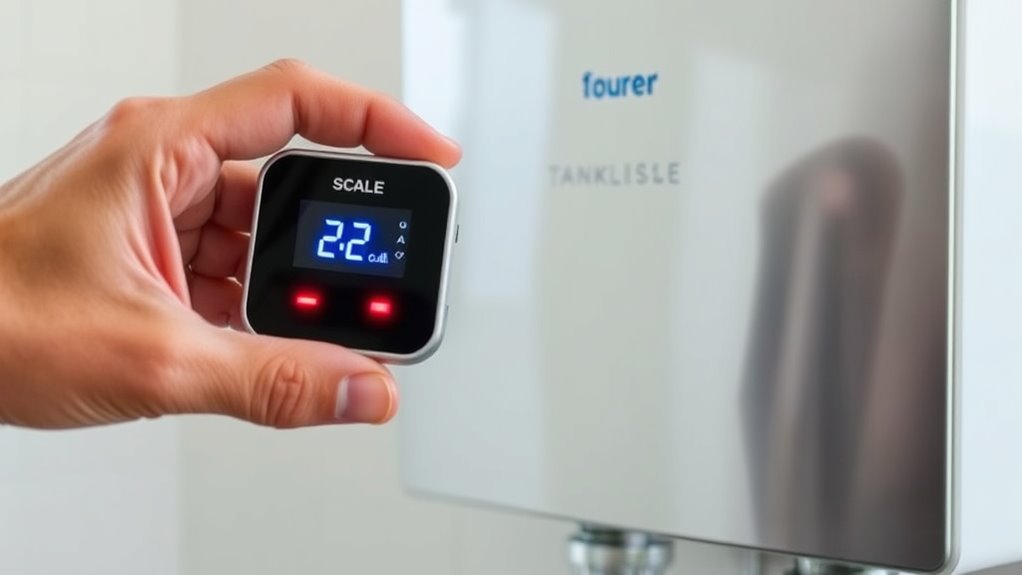
To maintain your tankless heater’s long-term efficiency, ongoing scale management is essential. Regular scaling prevention begins with water softening, which reduces mineral content that causes scale buildup. Installing a water softener or using descaling agents helps minimize mineral deposits inside your unit. Schedule routine flushing or descaling to remove any accumulated scale before it affects performance. Monitoring water quality and adjusting your softening system accordingly ensures consistent protection. Keep an eye on flow rates and temperature settings, as these can influence scale formation. By proactively managing mineral levels and performing maintenance, you extend your heater’s lifespan and maintain ideal efficiency. Ongoing scale management isn’t a one-time task; it’s a continuous process that safeguards your investment and keeps your system running smoothly.
Frequently Asked Questions
How Often Should I Recalibrate My Scale Control Calculator?
You should recalibrate your scale control calculator at least once a year or more often if you notice inconsistent readings. Following a regular calibration schedule ensures accuracy, so incorporate it into your maintenance tips. Keep an eye on performance and environmental changes, which may necessitate recalibration sooner. Consistent recalibration helps maintain efficiency and prevents issues with your tankless heater’s scale control system over time.
Can Scale Buildup Damage My Tankless Heater Beyond Efficiency Loss?
Yes, scale buildup can cause more than just efficiency loss; it can lead to heater damage. As mineral deposits accumulate, they can clog components, cause overheating, and wear out parts faster. This damage might result in costly repairs or replacements. To prevent this, regularly flush your tankless heater and monitor for signs of scale buildup, ensuring your unit stays in good shape and operates efficiently for years.
What Are the Signs of Excessive Scale Buildup in My System?
You might notice a slight decline in water flow or inconsistent hot water temperatures, which hints at calcium deposits and mineral accumulation. Unusual noises during operation and increased energy bills also serve as subtle clues. These signs indicate that excessive scale buildup is quietly affecting your system, reducing efficiency and potentially causing long-term damage. Addressing these issues early can help maintain your heater’s performance and extend its lifespan.
Is Professional Assistance Required for Advanced Scale Prevention?
Yes, you should consider professional maintenance for advanced scale prevention. While DIY troubleshooting can help with minor issues, experts have the tools and expertise to perform thorough cleaning and system checks. They can identify early signs of scale buildup that might go unnoticed and implement effective solutions. Relying on professionals guarantees your tankless heater operates efficiently and prolongs its lifespan, saving you time and costly repairs down the line.
How Does Water Temperature Affect Scale Formation and Control?
You’ll find that higher water temperatures increase mineral saturation, which accelerates scale formation. When water chemistry shifts toward greater mineral saturation, minerals like calcium and magnesium become more likely to precipitate out, forming scale. To control this, you should monitor water temperature closely, keep it at ideal levels, and consider using scale inhibitors or filters. Adjusting temperature settings helps prevent excessive mineral buildup and keeps your tankless heater running efficiently.
Conclusion
Mastering scale control is like steering a ship through choppy waters—you need to stay vigilant and adjust your course. By understanding your water’s hardness, using the calculator wisely, and maintaining regular care, you’ll keep your tankless heater running smoothly for years to come. Think of it as tending a delicate garden—consistent attention and smart prevention will keep your system healthy and humming, no matter how turbulent the water gets.


